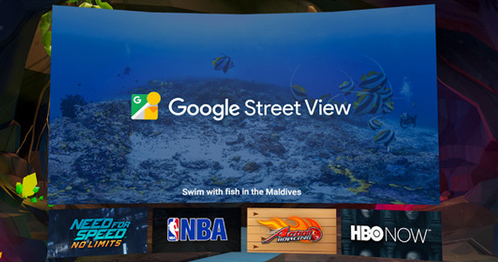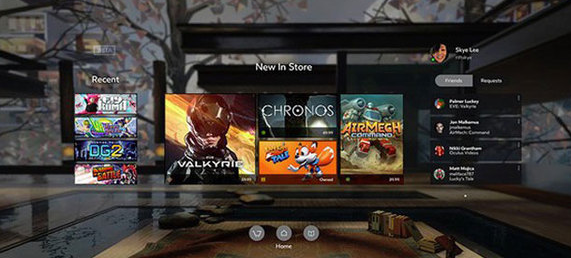Google has launched Daydream, a software platform that looks a lot like Facebook's Oculus Home. I believe that soon, major vendors will release a new generation of Android phones that support the Daydream platform.
The world's leading mobile phone manufacturers, such as Samsung, Xiaomi, Huawei, LG and HTC, have decided to launch the Daydream mobile phone or head-mounted display this fall. Mobile phones and headphones that support the Daydream platform are compatible with most devices. For example, Samsung mobile phone users can use HTC Headset. Google plans to sell Daydream heads and remotes.
Daydream will run through the Android N system and will include an optimized virtual reality mode. This means that when a smartphone is connected to the headset, the menus and related windows are displayed in a virtual reality environment. Android N supports the Vulkan API port, which can run high-end 3D games smoothly, giving players the best game visuals. This is a historic leap for the rough Cardboard experience. But the question is, is Daydream and Android N enough to help Google just face Facebook?
Advantages of Daydream

Google's biggest advantage lies in the huge Android user base. Now that smartphone makers have begun to make high-end devices that support Daydream, Google can set standards for Android virtual reality and plug the Play Store into the virtual reality market.
Another advantage of Daydream is the price. The price of high-end phones that can support the Daydream platform is far lower than that of computers that support Oculus heads (up to $1,000), and the highest-end Android devices are priced at around $600. The Oculus Rift itself is priced at $600. If Daydream's headline price is the same as Samsung's Gear VR, it's only $99. In general, Google's virtual reality experience is cheaper. In addition, the Daydream headshow with the addition of the capture technology may be more attractive than the Rift and Vive heads that require cable connections.
Piper Jaffray, the US investment bank, believes that this year's mobile head-to-head market will be larger than the high-end head-up market. Paijie expects Samsung to sell 5 million GearVR devices this year, while Rift is expected to ship 3.6 million units and Vive 2.1 million units. However, the virtual reality market still has a lot of room. Paijie believes that by 2025, the annual sales of virtual reality will reach 500 million.
Oculus' advantage

One of Facebook's strengths is that Oculus is a pioneer in the virtual reality world. In 2014, Facebook spent $2 billion to acquire Oculus, and no major company has ever valued virtual reality. Subsequently, Facebook continued to invest in virtual reality hardware and software, and launched Oculus Home in 2015 to establish the first virtual reality ecosystem. Now, most developers have joined the ecosystem, and Facebook sells 30% of the commission for each app.
Facebook focuses on the target players, and this group is willing to pay heavily for high-end game configurations. I believe that these people are more willing to buy Oculus instead of using unsatisfactory mobile head-mounted devices. This also means that Oculus will not have too much conflict with Daydream at the beginning, which is the same as Sony, because Sony's PSVR is aimed at its PS4 game console. The only thing Facebook needs to worry about is Vive's competition, which is why Oculus updated DRM to prevent content from being ported to Vive. YiViAn has been tracking it before.
Finally, Oculus's strength lies in Facebook as a backing, and Facebook's monthly active users are 1.6 billion. Just as Tencent continues to expand its game kingdom through a large QQ user base, I believe that Oculus' advantages will gradually emerge. Oculus has added game social elements to the system, and when Facebook's social network is fully integrated into Oculus, it will become Oculus's killer app. This is far from being comparable to Google.
It’s still too early
Although Daydream and the Oculus ecosystem are very close, Google and Facebook have different entry points. Google continues Cardboard's strategy to create a high-end mobile headline similar to the Samsung Gear VR. Facebook relies on computer-side virtual reality games, which limits the Oculus user market.
I believe that when the computer and mobile markets are fully integrated, the market battle between Facebook and Google will officially start. But it is too early to say who is the winner of the virtual reality ecosystem. Now, investors are still not sure whether Google will allow Android users to buy Daydream heads, and whether Facebook can integrate a huge social network into Oculus Home. Subsequent YiViAn will continue to track the market battle between Google and Facebook.
Wind Off Generator,Portable Wind Turbine,Off Grid Wind Turbine,Best Home Wind Turbine
Jinan Xinyuhua Energy Technology Co.,Ltd , https://www.xyhenergy.com
![<?echo $_SERVER['SERVER_NAME'];?>](/template/twentyseventeen/skin/images/header.jpg)